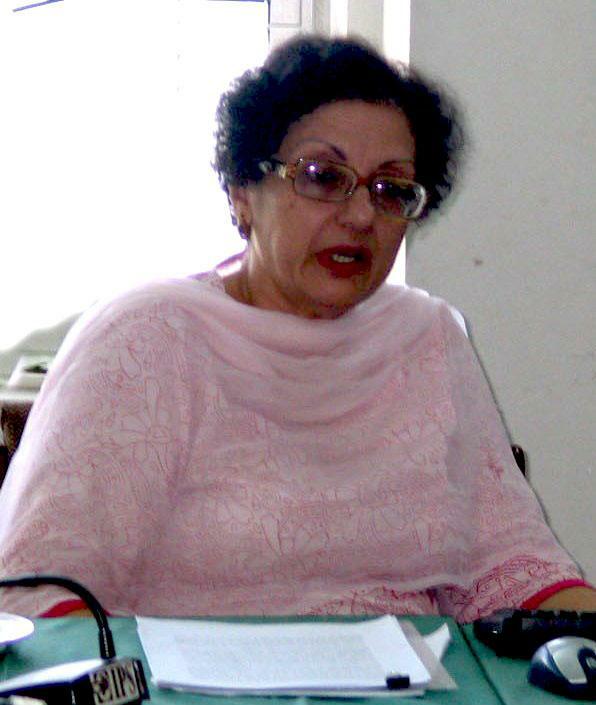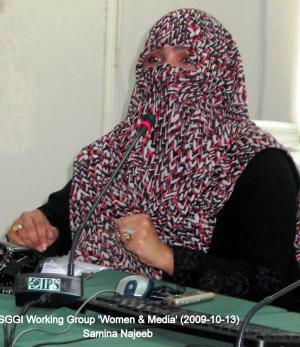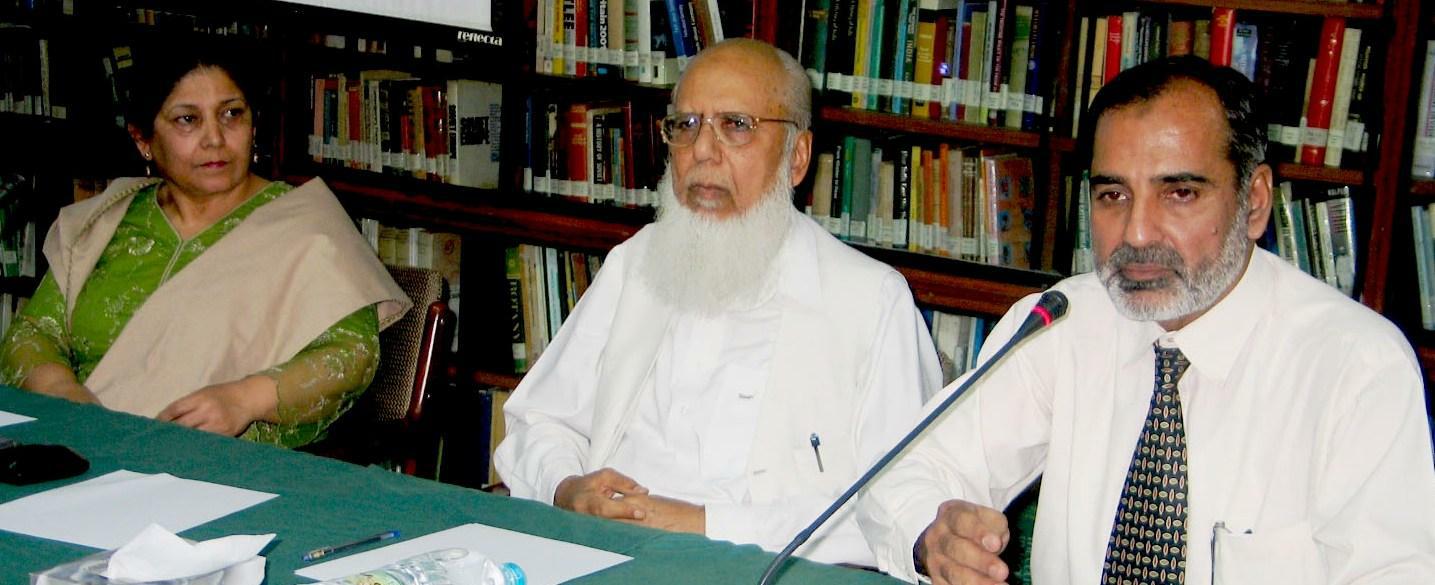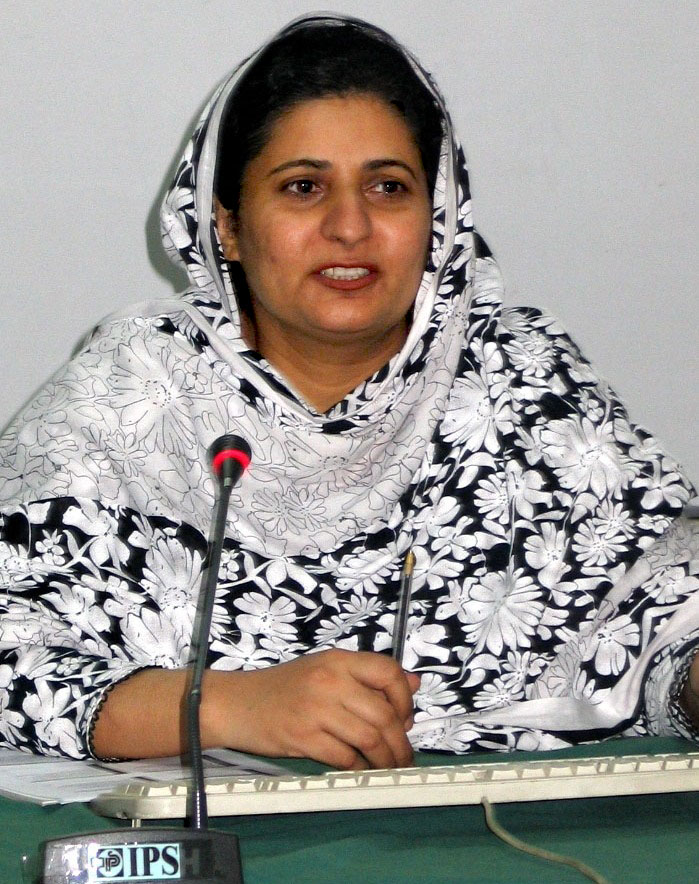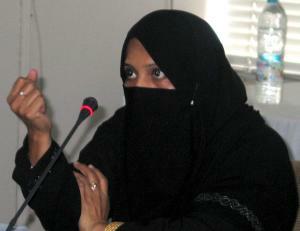Difficulties faced by Working Women
Fourth meeting of SGGI – Working Group on ‘Women & Economy’ was held with Mr. Khalid Rahman in the chair.
Beginning with her presentation on “Difficulties Faced by Working Women”, Ms. Bushra Hyder briefly discussed the traditional mindset about role of women and said that though women play a vital role in economic development of society, yet their contribution is rarely acknowledged.
SGGI Working Group on ‘Women & Economy’ holds its 4th Roundtable
Fourth meeting of SGGI – Working Group on ‘Women & Economy’ was held with Mr. Khalid Rahman in the chair.
Beginning with her presentation on “Difficulties Faced by Working Women”, Ms. Bushra Hyder briefly discussed the traditional mindset about role of women and said that though women play a vital role in economic development of society, yet their contribution is rarely acknowledged. Persuading a career out of home does not normally find encouraging responses. Workplace is considered men’s domain and earning of women is taken as a disgrace.
This approach however is fastly changing now, and financial as well as other social factors have not only increased the number of working women in all spheres of life, but also have improved the acceptability of their non-conventional contribution towards society. This development has also resulted in emergence of new challenges to which we need to adjust without compromising the positive features of our indigenous social construct.
Discussing the problems of working women, she explained that they have to face different types of difficulties and harassments. Harassment, in different manifestations from staring and stalking to sexual advances, is fear for many of them. Women do not generally feel intellectually challenged in their pursuits; rather they face psychological pressures, which restrict their active participation in work. Such annoying behavior is not limited to any specific society or any section of society; even the employers, highly educated bosses and government officials, also cause concerns.
The fear of Police is more common in women than men, and they avoid going to the police station for registering a complaint for any offending incident. It is unfortunate that citizens feel more defenseless in the presence of a police official. A woman is always apprehensive of likelihood of harassment from the policemen. Police needs to be sensitized on gender issues, and made human friendly in their responses to the public complaints. A woman would go to a police station only if she is provided with a secure and trustworthy environment.
Women are however not always weak and subjugated; they enjoy active support and respect as well from their male relatives and colleagues. In professional sectors, many women have made inroads with their confidence, and have proven their abilities. There are cases where organizations also facilitate them with equal rights and remunerations.
Ms. Hyder noted that the behavior of men towards a woman also depends on her own attitude. It is a fact that in practical life, every person, either male or female, has to face certain challenges. Anything negative should not be labeled as gender harassment. Professional attitude and high moral values have to be implanted in general, to reduce incidence of negative attitudes.
 In our traditional agriculture set up, men and women work together; hardly any case of gender harassment takes place. Besides the prevailing religious and social traditions, this is apparently because women in rural cultures work in groups, when they are out of their homes, and are often joined by the men of their family.
In our traditional agriculture set up, men and women work together; hardly any case of gender harassment takes place. Besides the prevailing religious and social traditions, this is apparently because women in rural cultures work in groups, when they are out of their homes, and are often joined by the men of their family.
In certain sectors, women are taken as cheap labour and are paid fewer wages than their male counterparts. Females’ workplace, too, is not often adequately designed where they could feel at ease during work and break timings. Such unfriendly and oppressive behavior of employers is not a peculiarity of our society; rather it is a world-wide problem, and an offspring of the capitalistic approach, in which the real goal of any entrepreneur is profit maximization, and not human welfare.
Poor transport system is also adding to the problems of working women. Public transport is costly, scarcely available and unpleasant. Government is still unable to provide adequate transport facilities to the commuters, even in the major cities of the country.
Working women find themselves in another dilemma: they always feel that home is their original domain, which they have to sustain in all circumstances. Women generally prefer to stay at home, and normally, do not opt for the job out of choice, but out of necessity. They always have a feeling of guilt for sparing less time for family and maternal responsibilities. This dual responsibility proves the double burden on her, and resultantly, she has to fight simultaneously on two fronts.
Some special initiatives have been undertaken by the public and large private-sector organizations to facilitate women in their household jobs, but they are still insufficient, and are primarily related to the maternity issues. Such benefits are available to a smaller section of working women, while majority has to compromise on their basic rights as women.
Proposing the solutions, she said that proper legislation and implementation of laws is necessary to create a healthy and friendly environment at work places. Social security, social insurance, basic necessities, poverty reduction, and justice should be provided by the government to female workers. Overall advancement of the society would guarantee the welfare of women too.
 Uniform wages should be paid to both women and men for same job, without any discrimination. The employers should facilitate the working women by giving incentives, and educate their employees not to harass others. Separate buses and bus stops for women can reduce the transport problems as well as the mental stresses for them.
Uniform wages should be paid to both women and men for same job, without any discrimination. The employers should facilitate the working women by giving incentives, and educate their employees not to harass others. Separate buses and bus stops for women can reduce the transport problems as well as the mental stresses for them.
Media should play its role to educate people, and uphold the respect of women in its programs and publications.
A recently conducted cross-sectional survey by Family Practice Centre, Islamabad suggests that women, if given an alternate solution to their economic needs, would quit their jobs.
The presenter stressed that the solution of women problems is in their own hands. Women should feel proud of their own values, and transmit them to the next generations. The character of a person is built in the hands of his/her mother. Women, in our society, enjoy the power and support at homes. Hence, they should utilize this opportunity to build the future of mankind.
Discussing the increasing role of women in professional fields, the members noted that women mostly prefer those jobs, where intellectual contributions are involved. Information technology, banking and other services sector organizations have more attraction for women. This implies that more important is to utilize the expertise of women than to drag them in all spheres of life, without having a regard for the requirements of their personal lives. There is a need to identify those sectors of national life, where women can contribute more effectively, and utilize their abilities to the fullest of their potential.
 Some social sector organizations consider legislation as the best way to solve the social problems that are faced by women, while the experience has shown that merely passing legislation is not the ideal answer. The western nations have tried their best to resolve social issues through laws, regulations, and codes of conduct, but despite the well-thought out legislation and excellent implementation mechanism, women in West have to face discrimination and oppression. In spite of being the flag bearer of gender equality, United Kingdom is not offering the women equal wages (42% less than men). A sustainable change requires a number of measures in social and educational fields, of which, legislation normally should be the last stage.
Some social sector organizations consider legislation as the best way to solve the social problems that are faced by women, while the experience has shown that merely passing legislation is not the ideal answer. The western nations have tried their best to resolve social issues through laws, regulations, and codes of conduct, but despite the well-thought out legislation and excellent implementation mechanism, women in West have to face discrimination and oppression. In spite of being the flag bearer of gender equality, United Kingdom is not offering the women equal wages (42% less than men). A sustainable change requires a number of measures in social and educational fields, of which, legislation normally should be the last stage.
In the profit motivated endeavors, there is always a danger of exploitation and oppression. Any person, obsessed with the urge of profit-maximization, would do all that he/she could, to reduce his costs and increase the profits; he would prefer cheap labor, and hire it even at the cost of moral values, and without considering the gender of the labor. This is also evident from the fact that in most cases, the behavior of female bosses and employers, with their female staff, is not different with that of men.
When both men and women want to pursue their careers simultaneously, the family institution will have to suffer. An ideal family will and should always plan the careers with mutual consultation, and keeping in view the specific family needs and environment.
The whole debate of women empowerment focuses on the ‘rights and privileges’ for them which implies as if there is a conflict between the genders, while the problem in our society is not gender specific discrimination. For instance, the current situation is that women are getting greater number of opportunities for higher education in our country and are ahead of men in this regard. Hence, this debate should be comprehensive. There are legal, social, cultural and economic dimensions associated with the issue and none of them is independent. While talking about the ‘empowerment of women’, we should keep in mind the values and norms of the society; as it directly hits the family-scheme of society, which is a precious asset for us.
Similarly, defining ‘work’ purely in economic terms also needs to be revisited since the current usage implies as if everything else done voluntarily is useless.
 Thus, while discussing the issues and concerns about working women, the main emphasis should be on the ‘opportunities for women’, as it is of utmost importance. Like every human being, a woman has a ‘natural desire for the expression of her inborn knack and abilities’; even a small baby shows his natural guts through his actions and movements. So, if a woman learns something, she craves for expressing it in some way. It is quite encouraging that nowadays, women have much more opportunities and prospects for the assertion of their individuality and talents. The services sector has increased the chances for women with its comfortable environment, where they can actively participate and excel, even from a distant place. Hence, if the focus is right, this issue will, hopefully, find its way towards a positive solution.
Thus, while discussing the issues and concerns about working women, the main emphasis should be on the ‘opportunities for women’, as it is of utmost importance. Like every human being, a woman has a ‘natural desire for the expression of her inborn knack and abilities’; even a small baby shows his natural guts through his actions and movements. So, if a woman learns something, she craves for expressing it in some way. It is quite encouraging that nowadays, women have much more opportunities and prospects for the assertion of their individuality and talents. The services sector has increased the chances for women with its comfortable environment, where they can actively participate and excel, even from a distant place. Hence, if the focus is right, this issue will, hopefully, find its way towards a positive solution.


